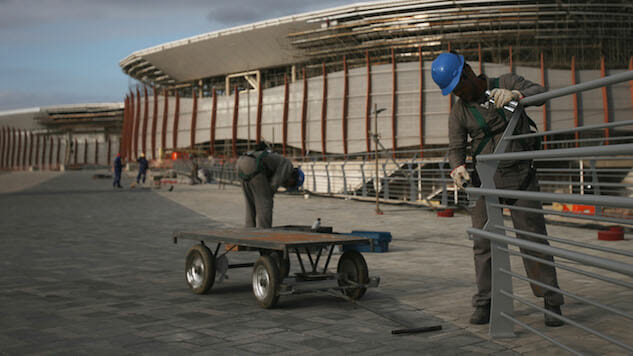Ready or Not, the Rio Olympics Are a Month Away
Photos courtesy Getty Images
Yesterday, Olympic organizers held a press conference, enthusiastically reassuring members of the press that everything is fine just a month before the opening ceremony. ”[The Games] will be a maximum success in this beautiful city of ours,” said Rio 2016 president Arthur Nuzman. He had good reason to seek to assuage outsiders’ concerns: in the 24 hours preceding the event, local police staged a protest at the airport, saying they are unable to protect visitors since they haven’t been paid in months, while Rio mayor Eduardo Paes told CNN that the state government’s security efforts had been “terrible.”
Despite countless setbacks and even some demands to move or cancel the Games, the controversial Rio 2016 Olympics are on and have reached the home stretch. It’s easy for foreign audiences to look at all the mishaps and assume the Olympics will be a disaster. But if Rio’s history with big events teaches us anything, it’s that the city knows how to entertain, despite lingering, deeply-entrenched issues that are sure to remain after the international spotlight comes and goes.
Last-minute construction, failed environmental promises, and the State’s financial calamity
As we get down to the wire, the Rio Olympics are not exactly making a graceful entrance. Finishing touches on construction projects are going literally day and night. Residents in Copacabana, near the incomplete Beach Volleyball stadium, were woken on Sunday by the sound of a jackhammer, which persisted from 11:30 p.m. until 1:30 a.m.
“It was the middle of the night! It was really loud and very inconvenient,” said Andrea Lima, 44, who lives about 100 feet from where the jackhammer was making way for Olympic signage.
“Maybe they’re doing it at nighttime on purpose, so that people don’t see them rushing to get everything in order last minute,” she speculated.
Other key construction projects are lagging, like a metro extension project, which will bypass some of Rio’s most congested roads, and a rapid bus line that runs from the airport to the Olympic Park. Despite the public’s mounting doubt, authorities have guaranteed that the metro extension will be ready, just four days before the Games start.
“I’m not even sure they’ll be able to open it for the Olympics,” said Olavo Toledo, a resident of the Barra da Tijuca region of Rio—host to the main Olympic site. “It seems like it’s still missing a lot to be complete,” he added. Toledo also reported that the construction has been unorganized and disruptive to the traffic in the region for years, but believes it’s gotten worse since the beginning of the year in the rush to finish.
The Rio 2016 sailing venue, on the other hand, will miss its mark when August 5 rolls around. Rio’s beautiful Guanabara Bay may boast an ideal backdrop for a sailing competition, but it’s also the destination for the majority of the metropolitan region’s raw sewage. Athletes have been arriving over the last few months and some sailors have already gotten sick, like the German sailor Erik Heil who fell ill during a test event last year.
After the Rio state Environmental Secretary admitted that their promise to clean 80% of pollutants in the bay was “not going to happen” in January 2015, the governing body of sailing, ISAF, called for the venue to be moved, but planners held their ground, giving athletes no other choice but to keep their mouths shut and bear the waters.
On top of the delayed construction and the polluted bay, the Rio de Janeiro State government recently declared a financial “calamity,” amid a global slump in oil prices, which the Rio economy heavily relies on. As a result, the state asked for and was granted a 2.9 billion reais ($830 million) bailout from the federal government to cover security and other operational costs during the Games.
-

-

-

-

-

-

-

-

-

-

-

-

-

-

-

-

-

-

-

-

-

-

-

-

-

-

-

-

-

-

-

-

-

-

-

-

-

-

-

-









































